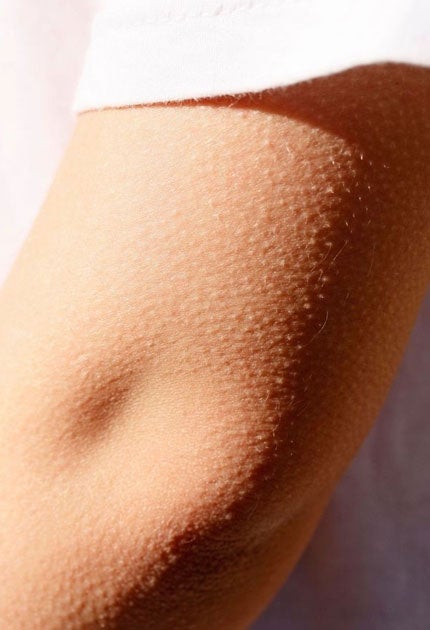Goose pimples: Chills, they're multiplying
It's not just cold weather that gives us goose bumps - research shows that certain songs can have the same effect

Shiver me timbres, music really can give you goose pimples. People get chills down their spines when they hear certain pieces of music, according to new research, and it may be all down to the working of the body's defence mechanisms.
It's been found that people who are more open-minded and open to new experiences are most likely to have goose pimples. Increased loudness of the music, the unexpected start of vocals or instruments, and changes in tempo, are also more likely to make the hairs stand up on the backsof our necks.
"Whether we experience chills in everyday listening is based on our emotional response to the music,'' says psychologist, Emily Nusbaum of the University of North Carolina who led the study. "For people who experience a lot of chills, music is like a pumping soundtrack to life – supportive and integral in how we experience our surroundings; for people who don't, it is all like elevator music.''
Music is not the only cause of the chills and goose pimples. Other emotions and sensations – including fear, cold, anger, admiration, emotional memories, excitement and sexual arousal – can act as triggers too. Most people experience goose pimples at some time.
Commonly described as a feeling of tingling and shivers, usually on the scalp, the back of the neck, and the spine, they can occasionally spread across much of the body. The technical name for the phenomenon is "piloerection", defined as a visible standing up of the body hair and a poultry-like appearance of the skin's surface as tiny muscles attached to hair follicles contract.
These muscles are activated by the sympathetic nervous system, and piloerection has evolved as a defence mechanism in many species. Porcupines, for example, raise their quills when they are threatened, and the hairs of cats and other animals stand up when faced with a foe. This makes an animal appear physically bigger to its would-be attacker. In response to cold, the raised hair is a survival aid that increases the body's protection by conserving body heat.
The driving force behind piloerection is the stress hormone adrenaline, released in response to danger, but also in response to the cold, or as a result of anger and excitement, and to peaks in both positive and negative emotions.
Researchers have been increasingly looking at piloerection and the sensation of chills as indicators of intense pleasurable experiences. Simply thinking about a past, highly charged emotional event, like a wedding proposal, or winning a prize, can cause goose pimples and the chills.
One of the areas that is being increasingly investigated is that of music and the chills. A challenging finding from some of these studiesis that although most people experience music-induced chills sometimes, some never have them, and other people have them repeatedly.
The discovery by researchers at the University of North Carolina that personality is involved fits in with other research which shows that listeners need to have an intense liking for the effect to be seen.
Music that produces the chills may be specific to the individual: "Chills can be repeated in response to the same musical event over several days in one individual, but they cannot be triggered in different individuals in response to the same music,'' say researchers at Hanover University of Music and Drama.
Some music does seem to have wider effects, and classical music seem to have a bigger impact. Hanover researchers looked at the effects of different music and found that goose pimples and shivers could be stimulated by the "Tuba Mirum" from Mozart's Requiem in one in five people. Other have found similar effects with Mahler.
So forget cool jazz – it's classical tunes that will really set you a-quiver.
Subscribe to Independent Premium to bookmark this article
Want to bookmark your favourite articles and stories to read or reference later? Start your Independent Premium subscription today.

Join our commenting forum
Join thought-provoking conversations, follow other Independent readers and see their replies